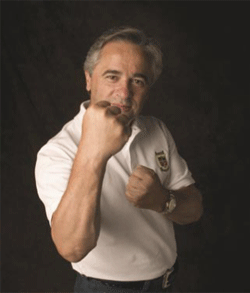THE CASE
FOR CANADA
Just
because he joined a big law firm doesn’t
mean Brian Tobin
is going to start pulling his punches
By
Mike Dojc
 |
|
Photograph
by Yuri Dojc |
I was number
five of nine, the middle
child in a family of nine children,
and I’ve often made the joke
that I was about 12 or 13 before anybody
figured out I was there. But it was
terrific. Growing up, we had a very
close family and it remains very,
very close today. It is a large support
network of parents and brothers and
sisters and extended families. We
all root for each other. It gives
you a great sense of being centred
and being solid with respect to your
place on the planet.
I think that Canadians are by instinct
culturally almost modest.
It’s not that we lack confidence
but we think that it is inappropriate
to demonstrate it too boldly. It’s
not that we lack ideas but we think
it is rude to shout them from the
rooftops. In Canada, one of our cultural
attributes I would say is a degree
of moderation, a degree of caution,
a degree, dare I say, of conservatism
about how we manifest our own personalities
day to day in our communities, in
our offices and within our families.
That’s a very attractive Canadian
attribute, but it’s one that
often leaves us looking a little bland
in the eyes of much of the rest of
the world. Perhaps we should learn
a little more from our friends south
of the border about how to be less
reluctant to express our own self-interests
and to demand a greater measure of
respect for what we define as our
own self-interests.
I grew up with Americans.
I lived on an American air force base.
One thing I know about Americans is
that if an American pushes you and
you move back a foot, the natural
instinct for most of them is to push
and take another foot. Until you push
back, they’ll keep taking ground.
It’s a lesson Canadians might
learn.
|
'We're still too heavily
taxed in this country ...
we've got three big
layers of government' |
We’re still too heavily taxed
in Canada. We’re still
over-governed in Canada. We’ve
got three big layers of government—municipal,
provincial and federal—and,
by the way, I share, for example,
here in Toronto Mayor [David] Miller’s
view that we need to look at how cities
are empowered to govern themselves.
What Canadians should do when they
think about health care is
go back and look at what Tommy Douglas
said. When Tommy Douglas introduced
health care, he introduced a system
that was far less complex, far less
generous, far less comprehensive than
the system we have today. And certainly,
Tommy Douglas never argued for a health-care
system where you would spend 40 or
50 cents of every tax dollar you collected
delivering health care. I think there
probably is a role for governments
to sit down and courageously and bravely
and truthfully have a dialogue with
Canadians about how we maintain the
public health-care system. And how
do you do it? Probably by making smaller
the range of services now being offered
and by inviting the private sector
to help deliver not a private health-care
system but to deliver more efficiently
portions of the public health-care
system.
| |
 |
Canada is
a country that is a virtual warehouse
of resources and we haven’t
even figured out where half the warehouse
is yet. The riches of this country—offshore
oil and gas, mineral resources, natural
gas resources, forestry resources
and rich agricultural lands—are
stunning, almost incomparable in the
world. It is a country that increasingly,
in particular over the past decade,
has invested in its human resources
and in research and development. Ten
years ago, we were talking about a
brain drain constantly. Every second
article in every newspaper was about
the brain drain. We don’t talk
about it anymore. We’ve invested
in our universities again, we’ve
invested in R and D, we’ve had
federal governments, provincial governments
and the private-sector partner, and
so we are the incubator for a lot
of the great new ideas and knowledge
that are being discovered. We are
the country that is taking that new
knowledge, revealing it and quickly
adapting it to private-sector opportunities.
We’re the first adapter in many
cases.
Anybody who believes that the world,
this global economy, is static,
or that the status quo can be counted
upon, is being foolish. We’re
seeing a large chunk of the manufacturing
base of the Western world being moved
to China, India, Vietnam. You now
have voices in the U.S. Senate and
Congress calling for the United States
to stop that drift to keep these jobs
at home in the States. The truth of
the matter is you can’t.
If you are going to have a global
economy, you are going to
have a wide-open trading system that
allows the whole world to participate.
You can’t stop growth of a new
manufacturing base in parts of the
world that are just developing that
base. So what do you have to do? If
you’re going to succeed in the
future, going to create the new jobs
of the global economy, you have to
be a country that is expert, that
is proficient at revealing new knowledge
and being an early and first adapter
of that new knowledge. And even as
you lose some of the traditional manufacturing
jobs that you’ve had, you’ve
got to create a whole new layer of
opportunity on the knowledge side.
That is Canada’s challenge.

Brian Tobin works a senior business
adviser to the law firm Fraser Milner
Casgrain LLP in Toronto.
The former premier of Newfoundland
and Labrador spent 26 consecutive
years in politics, serving
as Minister of Fisheries and Oceans
(1993-1996) and Minister of Industry
(2000-2002).
He was interviewed by Mike Dojc.
|